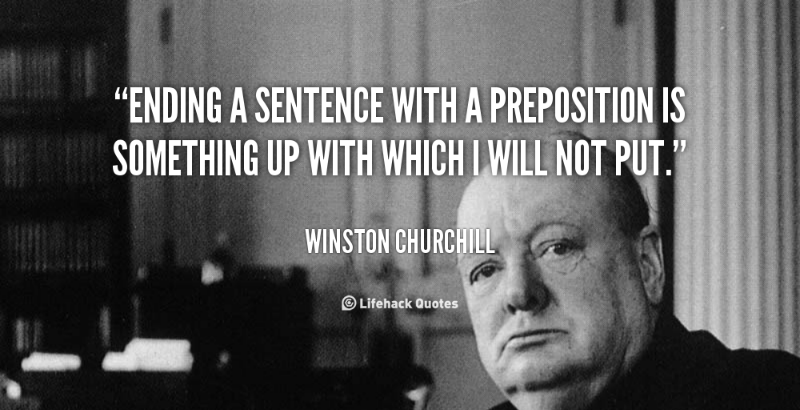I love writing. I love language. I love reading a sentence that flows with such lyricism that stopping it could be likened to a blow against the very fabric of nature.
So it comes to no surprise that I’m all for preserving language and abiding by its grammar rules. For me, grammar rules are there for good reasons. They exist to ensure that we’re able to express what we want to say with complete clarity and confidence.
However, I believe that some rules are made to be broken. I believe that some rules don’t help with clarity. I believe some rules are outdated. Plus, language is fluid and should grow and change as society does.
So I like to start sentences with “and”. Sometimes there’s nothing like good ol’ slang. And I think using “I” makes things way more personal and creates connections with readers like no other word can.
And I want you to learn how to write without fear of the Grammar Police reigning down their corrections of terror on your content.
But before we go any further, here’s some ground rules:
- Think about your audience. If you’re writing an academic paper, you should probably be writing in a formal tone. If you’re writing for an audience of small business owners who’ve very little time to waste, you want to keep things informal and straight to the point.
- Be true to your voice where possible. If you’re writing for personal reasons, or in a market that’s more informal, this will come naturally. However, if you’re writing in a more formal tone, this is going to be more of a challenge, but one that you should definitely work on.
- Understand the context. What is the topic you’re writing on? What kind of content are you creating? An EBook will be more formal than a blog, for example.
Now, on to the rules you should know (and break).
Grammar Rule #1 Never end a sentence with a preposition
This is probably one of the most frustrating grammar rules out there for me. Whenever I see a clunky sentence rearranged as to avoid a dangling prepositions, I die a little inside.
Ok, so that’s a little bit dramatic.
But from where has this rule come?
I don’t know, but I do know that that sentence sounds bizarre and should be written “where has this rule come from?” Honestly, appeasing the Grammar Police on this one makes you look like a crappy writer. So please, in the interest of readability, clarity and my own poor soul, end your sentences with prepositions when necessary.
Grammar Rule #2
Do not begin a sentence with a conjunction
Another rule that I can’t quite understand is the one that tells us that we’re not supposed to start a sentence with a conjunction. The rule is entirely unjustifiable. Many believe that it all started with teacher’s attempting to teach their students basic sentence structures and, in an effort to avoid fragmented sentences, taught them that they weren’t supposed to start a sentence with a conjunction.
But whatever the reason, this is definitely a rule you can break. Using conjunctions at the start of a sentence is a great way to grab your readers’ attention and emphasize a point. But, as always, use it wisely and in moderation.
Grammar Rule #3
Avoid splitting infinitives
Ah, the dreaded split infinitive.
You know, I once handed in a college paper and used a split infinitive in one of my sentences. I knew what I was doing, but the sentence worked wonderfully the way it was written so I thought that the tutor would forgive the transgression. However, I was harshly corrected by my tutor, who then promptly handed me a list of books on English grammar.
See, the thing is, I had this awesome English teacher in second level. And she’d encourage us to split an infinitive or two if it made our writing sound better.
I mean, why shouldn’t you be allowed to let another word come between “to” and its verb? Can you imagine if “to boldly go” was written grammatically correct? “To go boldly!” just doesn’t have the same ring to it.
Hey, if a rule doesn’t make sense, don’t abide by it. The internet will forgive you, I promise.
Grammar Rule #4
Don’t use personal pronouns
This one harks back to our school days, for sure. And back then, I guess I can understand why it was enforced. Starting every history essay with “I think” or “I believe” is a surefire way to omit any substantial facts. (And as a former History teacher, I can tell you how much of a pain that is)
But this is the internet, not school. You’re writing content that is supposed to be engaging as well as informative. Using personal pronouns makes writing more engaging and it also allows readers feel like they’re getting to know you.
Grammar Rule #5
Don’t Do Not Use Contractions
If you like sounding like a robot (or pretentious Victorian Englishman), then sure, avoid contractions. However, if you’re trying to sound like a human being, a contraction or two can go a long way.
For formal and professional writing, this is a legitimate rule to follow. Contractions are more casual and informal, hence why they’re great for writing online. If you’re writing marketing material, then your written voice should reflect the way you talk by and large. The more you can achieve a conversational tone between you and your reader, the more likely they’ll feel more comfortable, and thus more receptive to what you have to say.
Grammar Rule #6
Don’t Use Slang
First of all, let’s take a minute to remember the first ground rule: think about your audience.
Using slang in your writing is one of those rules that you can either use or ignore at your discretion. For example, if you’re writing about elder law, you probably don’t want to be using words like “awesome”, “rad”, “totes”. Older people don’t use that language, and the context is all wrong. But, on the other hand, if you’re selling a hipster unicorn t-shirt, any of those words would be appropriate and even entertaining to your audience.
Moreover, even when you do choose to use slang in your writing, use it in moderation. Think about the language that your target audience actually uses, and try to reflect that in you’re writing. Even the youngest of heart won’t search “totes awesome t-shirts” all the time (although there’s definitely a market for that, too).
Grammar Rule #7
“An” always goes before nouns starting with a vowel; “a” always goes before nouns starting with a consonant
This rule should be broken based on sound, not spelling. The purpose of using “an” instead of “a” is to make a sentence easier to say. “An ant” much easier to say than “a ant”. Likewise, “an hour” is easier to say than “a hour”. “An historical event” sounds better than “a historical event” and “a united team” rolls off the tongue much better than “an united team”.
Language, and the rules that uphold it, are supposed to work to help understanding and clarity. If putting “an” or “a” in front of another word is clunky when spoken aloud, then change it up.
Grammar Rule #8
Never use one-sentence paragraphs
When writing for the internet, you want to be able to make your content as easy for readers to skim as possible. People are searching for quick and easy answers, and don’t want to read your content word-for-word.
One sentence paragraphs are effective because they are easy to read while skimming a page.
They stand out from the crowd of text.
Fear not the one-sentence paragraph. The internet needs you!
Grammar Rule #9
Always use pronoun-subject agreement
The issue regarding pronoun-subject agreement arose when women began to voice their feelings of exclusion (and confusion) when “he” was used as the assumed gender when the subject’s gender was ambiguous. For example, “everybody should take his seat”. As you can see, the masculine pronoun is assumed, because the word “seat” requires a singular agreement to be grammatically correct.
Grammar purists adamantly refused to bend this rules for years, and yet, we’re starting to see this rule being bent – and broken – more and more often.
To amend the situation, some writers started to use the stylistically painful “he or she”. Nowadays, it’s more common to use of the pronoun “they”, “their” and “them” when the gender of a person is unknown, even though it does not agree with the singular subject, as in the example below:
“Everybody should take their seat.”
If it sounds a bit clunky now, not to worry. A bit of practice and you’ll soon see that it’s not only inclusive, but makes your life much easier.
Grammar Rule #10Proper use of whom
Whoever tells you to use “whom” instead of “who” is 1) the Victorian era, or 2) a pretentious snob. Either way, don’t trust them. Oh, and don’t use “whom”, unless you want to be the Ross Geller of internet writers.
Don't leave us!
 Stay in touch. We send out awesome content marketing tips and tricks, straight to your inbox. We'll even send you some free goodies to get you writing-fit.
Stay in touch. We send out awesome content marketing tips and tricks, straight to your inbox. We'll even send you some free goodies to get you writing-fit.


